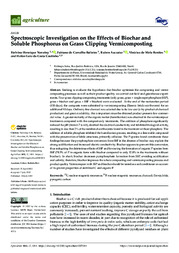Spectroscopic investigation on the effects of biochar and soluble phosphorus on grass clipping vermicomposting.
Spectroscopic investigation on the effects of biochar and soluble phosphorus on grass clipping vermicomposting.
Author(s): NOVOTNY, E. H.; BALIEIRO, F. de C.; AUCCAISE, R.; BENITES, V. de M.; COUTINHO, H. L. da C.
Summary: Seeking to evaluate the hypothesis that biochar optimises the composting and vermicomposting processes as well as their product quality, we carried out field and greenhouse experiments. Four grass clipping composting treatments (only grass, grass + single superphosphate (SSP), grass + biochar and grass + SSP + biochar) were evaluated. At the end of the maturation period (150 days), the composts were submitted to vermicomposting (Eisenia fetida earthworm) for an additional 90 days. Ordinary fine charcoal was selected due to its low cost (a by-product of charcoal production) and great availability; this is important since the obtained product presents low commercial value. A greater maturity of the organic matter (humification) was observed in the vermicompost treatments compared with the compost-only treatments. The addition of phosphate significantly reduced the pH (from 6.7 to 4.8), doubled the electrical conductivity and inhibited biological activity, resulting in less than 2% of the number of earthworms found in the treatment without phosphate. The addition of soluble phosphate inhibited the humification process, resulting in a less-stable compound with the preservation of labile structures, primarily cellulose. The P species found corroborate these findings because the pyrophosphate conversion from SSP in the absence of biochar may explain the strong acidification and increased electric conductivity. Biochar appears to prevent this conversion, thus mitigating the deleterious effects of SSP and favouring the formation of organic P species from SSP (78.5% of P in organic form with biochar compared to only 12.8% in the treatments without biochar). In short, biochar decreases pyrophosphate formation from SSP, avoiding acidification and salinity; therefore, biochar improves the whole composting and vermicomposting process and product quality. Vermicompost with SSP and biochar should be tested as a soil conditioner on account of its greater proportion of stabilized C and organic P.
Publication year: 2022
Types of publication: Journal article
Unit: Embrapa Soils
Observation
Some of Embrapa's publications are published as ePub files. To read them, use or download one of the following free software options to your computer or mobile device. Android: Google Play Books; IOS: iBooks; Windows and Linux: Calibre.
Access other publications
Access the Agricultural Research Database (BDPA) to consult Embrapa's full library collection and records.
Visit Embrapa Bookstore to purchase books and other publications sold by Embrapa.

